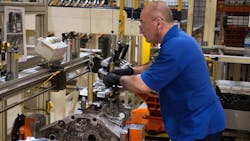The Global Manufacturer: Powering the UK Auto Revival
If you think British car manufacturing went the way of the Triumph and the MGB, you haven’t been keeping up. UK automakers are experiencing – dare we say it – a manufacturing renaissance.
This year, auto manufacturers expect to produce about 1.6 million cars in the United Kingdom, a likely increase of 6%. Projections are that the industry will produce a record number of vehicles by 2017. About 80% of British car production is exported – half to European Union countries and half to China, Russia and the U.S.
There are a number of factors driving this growth – pent-up demand from the recession (new car registrations are up over 10% in the first six months of 2014, the best first half since 2005), new technologies that make new cars cheaper to drive than the aging cars sitting in motorists’ driveways – but one of the major factors is that the UK is becoming a global center of engine development and production.
In 2014, the UK will produce 2.5 million engines. Ford (IW 500/6) (F) is a significant contributor to that total. At its facilities in Dunton and Dagenham, Ford designs and engineers the gasoline and diesel engines that go into half of all Ford vehicles. As a general rule, gas engines over 2 liters are designed in Dearborn, Mich., while smaller gas and diesel engines are designed in the UK.
On a recent visit to Ford’s Dagenham Estate (modeled by Henry Ford in 1929 on the River Rouge plant), Brett Hinds, engine design chief engineer for Ford, said the company is committed to providing the powertrains that customers want, be they gas, diesel, hybrids or electric.
At Dagenham, Ford is investing $400 million to produce a new low-CO2, 2.0-liter diesel engine that will debut in November 2015. The plant is expected to annually produce 350,000 of the engines, which will meet stricter Euro 6 emission levels being imposed by European Union regulators.
Currently, Dagenham manufactures more than 739,000 diesel engines. The plant produces over 100,000 diesel engines for Jaguar Land Rover, a UK manufacturer whose production increased by 11% in 2013.
Dagenham will be producing the new 2.0-liter diesel engine in a completely revamped factory at the site. Pat Manning, production manager for the engine, said the design of the old factory was like being handed the keys to a house and not having input on where things like the stairs would go. Not with the new plant layout, which will feature CNC machines that each cost about $1 million. Ford has been closely involved in the machines’ design, to help ensure they are ergonomically sound to operate and maintain. For example, the machines have built-in platform steps to facilitate access to the top of the machine. Production areas are being designed to be both quieter and have better air quality.
“Engine manufacturing facilities have been evolving significantly over time,” said Martin Everett, the Dagenham engine plant manager. He noted that the old transfer line arrangement required up to three years to put a new engine into production. Dagenham’s use of CNC machines will offer considerably more speed and flexibility. Changeovers, he said, can happen in just a few months if necessary.
Ford isn’t the only manufacturer investing in engine facilities. Jaguar Land Rover is investing more than $850 million in an engine plant that will employ 1,400 near Wolverhampton, England. The plant will begin producing four-cylinder gasoline and diesel engines in early 2015.
In March, Bentley Motors, a division of Volkswagen, announced that it will consolidate its production of W12 engines at the firm’s factory in Crewe, England. Bentley will nearly double its annual production of the engines to 9,000 by 2017. Volkswagen had produced some of the Bentley engines in Germany, but soon the UK site will begin exporting engines to Germany for use in high-end Audis.
Like the U.S., the British car industry itself is powered by talent. That means making sure the existing workforce has the requisite skills to produce increasingly sophisticated products and attracting young people into the industry, said Michael Hawes, chief executive of the Society of Motor Manufacturers and Traders (SMMT), the U.K. automotive industry’s trade group. As with their U.S. counterparts, British firms are employing internships, outreach to educational institutions and coordination with government to help ensure they have the workforce they need. If there is any engine that will help the U.K. remain competitive in the automotive sector, young, inventive minds will be the primary example.
About the Author
Steve Minter
Steve Minter, Executive Editor
Focus: Leadership, Global Economy, Energy
Call: 216-931-9281
Follow on Twitter: @SgMinterIW
An award-winning editor, Executive Editor Steve Minter covers leadership, global economic and trade issues and energy, tackling subject matter ranging from CEO profiles and leadership theories to economic trends and energy policy. As well, he supervises content development for editorial products including the magazine, IndustryWeek.com, research and information products, and conferences.
Before joining the IW staff, Steve was publisher and editorial director of Penton Media’s EHS Today, where he was instrumental in the development of the Champions of Safety and America’s Safest Companies recognition programs.
Steve received his B.A. in English from Oberlin College. He is married and has two adult children.
